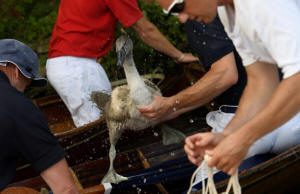|
On Monday, a
group of Boats led by the Queen's Swan Marker continued the
tradition, known as "Swan Upping."
"We go up the river in six traditional rowing skiffs - every
family of swans we come across, we will take them out of the
water, we will take them a shore. We will weigh them, measure
them and check them for any injuries," The Queen's royal Swan
Marker, David Barber told Reuters.
Cygnets are individually tagged, as part of conservation efforts
to protect the young birds.
"A lot of the injuries we get these days is through fishing
tackle. When the cygnets are very young, they get caught in
fishing tackle quite easily," Barber added.
Dressed in their traditional livery, the teams use six
traditional Thames rowing skiffs, each flying their flags and
pennants.
It takes them five days to cover the stretch of the Thames
between Sunbury near London out to Abingdon near Oxford.
They count all the adult swans and tag and monitor the health of
cygnets by weighing them and checking in their mouths.
The river can be a dangerous place for the young swans, at risk
from fishing hooks and wire.
A serious decline in the swan population in the mid-1980s was
reversed when lead fishing weights were replaced with a
non-toxic substance.
But growing demand for recreational use of the river has meant
the river is still a dangerous habitat for the royal birds.
"We've had a lot of problems over the last few years. Last year
we had 83 cygnets that we caught, weighed and measured. The year
before, we had 120, so you can see it has declined," Barber
said.
The tradition began in the Twelfth century where swans were
often killed for food at banquets.
Barber said that the royal involvement in the process can be
traced back to then.
"Her majesty has the right to own any swans swimming in open
waters in the United Kingdom if she so pleases," he added.
Those who carry out the tradition hope that it helps conserve
the future of the birds and educates younger generations.
[© 2016 Thomson Reuters. All rights
reserved.] Copyright 2016 Reuters. All rights reserved. This material may not be published,
broadcast, rewritten or redistributed.

|
|






